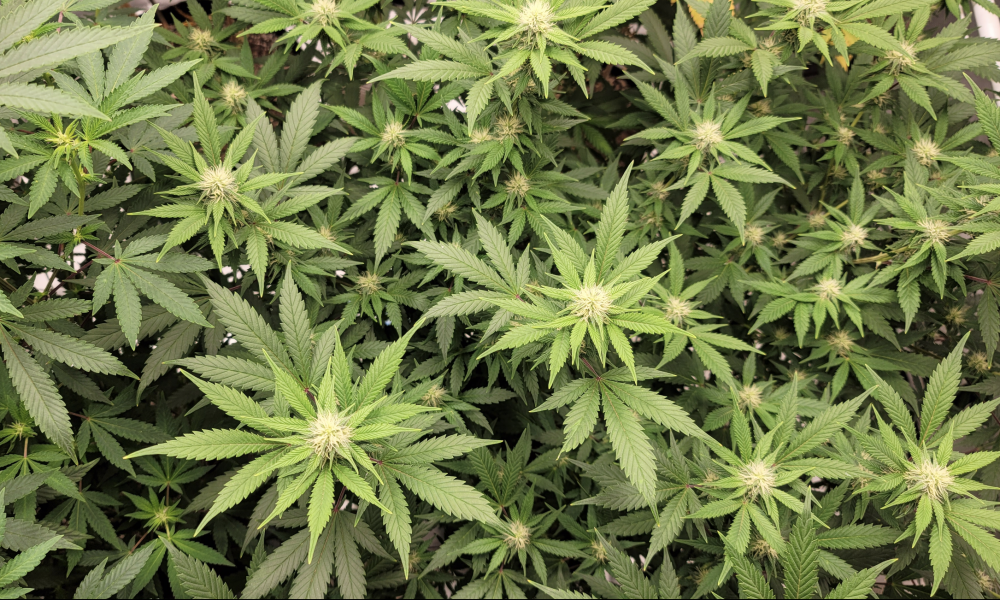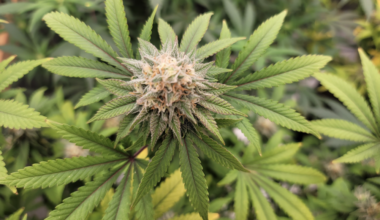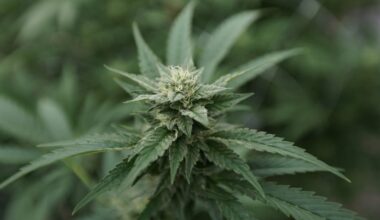President Joe Biden’s surprise announcement on Thursday that he is granting a mass marijuana possession pardons and initiating an administrative review of cannabis scheduling has set the internet ablaze.
Lawmakers, advocates and marijuana industry stakeholders are widely applauding the move, which comes just weeks before the November midterm elections. There has also been some pushback from conservative members of Congress.
Nearly two years since taking office after campaigning on cannabis decriminalization, rescheduling and clearing past marijuana records, Biden has finally answered repeated calls from bipartisan lawmakers and civil rights groups to use his executive authority to start righting the wrongs of prohibition.
Here’s how people are reacting to the news:
The Vice President
Today, @POTUS pardoned all prior federal offenses of simple marijuana possession. He has asked @SecBecerra and the Attorney General to review how marijuana is scheduled under federal law.
This is a step forward in correcting the historical injustices of failed drug policies.
— Vice President Kamala Harris (@VP) October 6, 2022
Members of Congress
I’ve been making progress to pass legislation to bring federal cannabis law in line with the views of the overwhelming majority of Americans, end the federal prohibition on cannabis, and make criminal justice reforms.
And this is a huge step forward in our fight! https://t.co/OznvQwopEL
— Chuck Schumer (@SenSchumer) October 6, 2022
Thank you, @JoeBiden! This is a historic moment and a major step forward.
Now we must continue the fight to end the federal prohibition of marijuana once and for all.https://t.co/lZZYqsiFTg
— Chuck Schumer (@chuckschumer) October 6, 2022
“For far too long, the federal prohibition on cannabis and the War on Drugs has been a war on people, and particularly people of color,” Senate Majority Leader Chuck Schumer (D-NY) said. “President Biden’s action to pardon people convicted of simple marijuana possession under federal law is a huge step forward to correct decades of over-criminalization.”
This is a historic step that will change so many people’s lives. No one should be in federal prison for simple marijuana possession, but we need to do more to catch federal laws up to Washington state’s laws when it comes to legalizing cannabis. I’ll keep pushing on this. https://t.co/MvVkAiaeqv
— Senator Patty Murray (@PattyMurray) October 6, 2022
This is a huge step forward in the fight to restore the lives destroyed by the criminalization of cannabis and failed war on drugs. I have been leading the effort on cannabis reform in the Senate, and I look forward to working with President Biden to build on today’s movement. https://t.co/SEziHUk5Zm
— Ron Wyden (@RonWyden) October 6, 2022
“Today is a huge step forward in the fight to restore lives destroyed by the criminalization of cannabis,” Sen. Ron Wyden (D-OR) said. “I echo President Biden’s call for states to do the same and repair harms done by the failed War on Drugs by pardoning all non-violent cannabis convictions.”
Biden’s call for states to follow suit and pardon those convicted of possessing marijuana at the state level will help thousands more.
— Senator Jeff Merkley (@SenJeffMerkley) October 6, 2022
BREAKING: President Biden just announced he’s pardoning all federal offenses of cannabis possession.
This is a good first step toward decriminalizing cannabis once and for all.
— Jeff Merkley (@JeffMerkley) October 6, 2022
I have long believed that marijuana should be legalized and those arrested for possession should be pardoned and have their records expunged. The President’s executive action today is an important step forward, but much more needs to be done.
— Bernie Sanders (@SenSanders) October 6, 2022
For years, I’ve stood with millions of Americans calling on multiple administrations to take action to issue pardons and decriminalize cannabis.
This move by President Biden is a historic decision — and it’s the right thing to do.
— Elizabeth Warren (@SenWarren) October 6, 2022
No one should be incarcerated for the simple possession of marijuana.
@POTUS’s decision to pardon thousands of individuals with federal convictions is a step in the right direction for meaningful criminal justice reform.— Senator Alex Padilla (@SenAlexPadilla) October 6, 2022
No one should be locked up for using marijuana. This not only ruins lives – it wastes taxpayer $s, hurts our economy & contributes to the scandal of mass incarceration. @POTUS’ action is a good step forward. Governors should follow suit. https://t.co/WWLJ6QI8vH
— Senator Chris Van Hollen (@ChrisVanHollen) October 6, 2022
This is great news & a needed step in the right direction. In NV, we’ve seen firsthand the positive impacts of cannabis reform on our economy– supporting small businesses & creating jobs. Now Congress must finally pass legislation to make significant changes at the federal level. https://t.co/cpKXcWAinl
— Senator Jacky Rosen (@SenJackyRosen) October 6, 2022
Good. Expunge all the records and legalize marijuana. https://t.co/kn5W38szzh
— Ed Markey (@SenMarkey) October 6, 2022
Once again, Biden’s response to record overdose deaths and murders is to be softer towards crime.
— Tom Cotton (@TomCottonAR) October 6, 2022
Our proud Democratic Majority will never relent in fighting for these reforms, and more, as we work to advance justice for all.
Read my full statement on President Biden’s historic marijuana reform here: https://t.co/3SzoZZQaBU
— Nancy Pelosi (@SpeakerPelosi) October 6, 2022
Let’s be blunt: The criminalization of marijuana has ruined countless lives.
Today’s action taken by @POTUS is a significant step in reversing the decades of failed policies criminalizing marijuana. https://t.co/JnqGSajJ6j
— House Judiciary Dems (@HouseJudiciary) October 6, 2022
We applaud @POTUS for taking these transformative steps to right the historic injustices of the failed War on Drugs by reforming our approach to marijuana criminalization.
Read the full release below ⤵️: pic.twitter.com/JJy3qYxerb
— The Black Caucus (@TheBlackCaucus) October 6, 2022
1/ Despite the fact that white, Black, and Latino people use marijuana at similar rates, a disproportionate number of people arrested, prosecuted and convicted are Black and Latino.
— Congressional Hispanic Caucus (@HispanicCaucus) October 6, 2022
3/ In addition, according to the ACLU, Black people are 3.6 times more likely than white people to be arrested for marijuana, despite similar usage rates.
— Congressional Hispanic Caucus (@HispanicCaucus) October 6, 2022
This is a vital step forward for ending the failed war on drugs that too often targeted people of color, especially Black and Latino men. While this announcement is welcome and long overdue, it is the first step of many that this Administration should take. https://t.co/afodFj4uOV
— Earl Blumenauer (@repblumenauer) October 6, 2022
“Today, President Biden took an important step in the fight to end the federal government’s failed and discriminatory prohibition of cannabis,” Rep. Earl Blumenauer (D-OR), co-chair of the Congressional Cannabis Caucus, said. “No president has stepped forward to pardon low-level marijuana offenders at this scale before.”
“This is a critically important step forward for racial justice in the failed war on drugs that too often targeted people of color, especially Black and Latino men,” he said. “While this announcement is welcome and long overdue, it is just the first step of many that this Administration should take.”
My statement regarding President Biden’s recent action on marijuana 👇 pic.twitter.com/KOM48L9aIT
— Rep. Ed Perlmutter (@RepPerlmutter) October 6, 2022
Thank you, @POTUS! Black people are arrested for marijuana possession nearly 4x as often as white people. This is an important step toward righting the wrongs of the failed, racist War on Drugs. https://t.co/HpZQAUgVvu
— Pramila Jayapal (@PramilaJayapal) October 6, 2022
No one should be in jail for simple possession or use of marijuana. I commend @POTUS on this important step.
Next up? Legalize it. https://t.co/6yB8mUcaeK
— Rep. Mark Pocan (@RepMarkPocan) October 6, 2022
Applaud the Administration for their necessary big step forward in bringing justice to so many. #Cannabis #SRA 👏🍃🔥
— Rep. Nancy Mace (@RepNancyMace) October 6, 2022
Deschedule 🗓
Banking access 🏦
Regulatory structure 📈Big first step @WhiteHouse; now let’s see some guard rails #SRA
— Rep. Nancy Mace (@RepNancyMace) October 6, 2022
The failed war on drugs has ravaged our communities, destabilized families, & inflicted trauma for too long.
Pardoning marijuana convictions will help address barriers to re-entry & set us on a path to healing.@POTUS‘ action today is a critical step forward. https://t.co/ph8XIniqdw
— Congresswoman Ayanna Pressley (@RepPressley) October 6, 2022
Marijuana prohibition has been the gateway drug for race discrimination on the streets of America.
Kudos to President Biden for his move to pardon federal offenders for simple possession and to create commonsense, equitable criminal justice policy in America.— Rep. Jamie Raskin (@RepRaskin) October 6, 2022
This is what leadership looks like. This is how we push forward justice.
Too many communities, families, and lives have been harmed by our failed approach to cannabis. Today, we begin to right those wrongs.
Thank you @POTUS. https://t.co/ViVH2Hi3zo
— Anthony Brown (@RepAnthonyBrown) October 6, 2022
A HUGE win for justice!
Our approach to cannabis has failed. This November, MDers can legalize cannabis. And, as AG, I’ll champion equity, economic opportunity for marginalized communities, and work to expunge the records of those serving time.
It’s time to lead with our values https://t.co/SzDtEOciFc
— Anthony G. Brown (@BrownforMD) October 6, 2022
The House has already passed the MORE Act, which decriminalizes cannabis. Now, it’s time for the Senate to do the same.
Congress must also pass my Drug Policy Reform Act, which would reshape the way our country views substance use and finally end the racist War on Drugs.
— Rep. Bonnie Watson Coleman (@RepBonnie) October 6, 2022
I applaud @POTUS for taking the first steps to decriminalize marijuana at the federal level. We must enact more common-sense measures to correct our flawed approach to the war on drugs. https://t.co/ZZSVdsEudv
— Dina Titus (@repdinatitus) October 6, 2022
This life changing executive action is a strong step toward finally righting the wrongs that Black and Hispanic communities disproportionately face because of the failed War on Drugs. We need a new approach, and Congress must be the next step. I applaud @POTUS for his leadership. https://t.co/o0N4kxT3a2
— Congresswoman Marie Newman (@RepMarieNewman) October 6, 2022
Black, Latino, and Indigenous people have carried the brunt of marijuana criminalization for too long.@POTUS’ decision today is justice for those convicted of non-violent drug crimes.
— Rep. Veronica Escobar (@RepEscobar) October 6, 2022
🙏🏾🙏🏾🙏🏾
Far, far too many Americans — a vastly disparate number of whom being people of color — were locked up for years for only having marijuana on them.
It was unjust then. And it’s being undone today.
Thank you for leading through morality, @POTUS.
Governors — take notes! https://t.co/MakVLKTTNw
— Yvette D. Clarke (@RepYvetteClarke) October 6, 2022
Black and brown people have been disproportionately punished for marijuana possession, and the effects of a conviction can last a lifetime. I applaud this move by @POTUS as we move toward a fairer justice system.
— Rep. Gwen Moore (@RepGwenMoore) October 6, 2022
The criminalization of marijuana and this nation’s failed ‘War on Drugs’ has devastated our communities of color. This is a great day for justice. The Senate must act to decriminalize marijuana once and for all. https://t.co/N1xUP23Kt9
— Jan Schakowsky (@janschakowsky) October 6, 2022
Reversing the harm caused by the war on drugs is among the defining civil rights issues of our time.
— Rep. Gerry Connolly (@GerryConnolly) October 6, 2022
Great move, Joe!
Pleased to see lawful permanent residents included, as even small marijuana charges can lead to deportation.
Let’s go further to undo the harm of racist marijuana laws: expunge charges, legalize cannabis, and invest in communities impacted by the War on Drugs. https://t.co/xpYY2fYxk3
— Congressman Chuy García (@RepChuyGarcia) October 6, 2022
Marijuana criminalization disproportionally impacts Black and Brown Americans and has set generations of families back. @POTUS’s announcement is an important step to help prevent more mass incarceration. Simple possession of marijuana shouldn’t put people behind bars for years. https://t.co/cJTznF93I1
— André Carson (@RepAndreCarson) October 6, 2022
Federal pardons for people convicted of marijuana possession brings us one step closer to restoring justice and humanity for people convicted of something so trivial.
Next we need to deschedule marijuana and make the marijuana industry more accessible!
— Jamaal Bowman Ed.D (@JamaalBowmanNY) October 6, 2022
I commend President Biden on today’s actions to pardon federal offenses of simple marijuana possession.
No one should be in jail solely for using or possessing marijuana—full stop. https://t.co/w7cwzSfHd4
— Adriano Espaillat (@RepEspaillat) October 6, 2022
This policy will allow those convicted of possessing a drug, now legal in California, to seek employment, housing, and military service without the barrier of felony conviction.
— John Garamendi (@RepGaramendi) October 6, 2022
Cannabis justice is racial justice. Black, Latino and Indigenous people have carried the brunt of marijuana criminalization. Entire communities have been upended by the failed War on Drugs.
This is a life-changing step toward ending injustice and repairing lives. https://t.co/bSxdjVWW3N
— Congresswoman Nikema Williams (@RepNikema) October 6, 2022
Today’s action by @POTUS is another step forward to fix decades of injustice. He is giving thousands of Americans their lives back by pardoning those convicted for possession of marijuana. I voted to federally decriminalize marijuana and it’s time the Senate passes our bill.
— Rep. John Larson (@RepJohnLarson) October 6, 2022
Federal officials
Looking forward to working with Attorney General Garland to answer @POTUS’ call to action to review how marijuana is scheduled under federal law. https://t.co/aXMcWCjJh2
— Secretary Xavier Becerra (@SecBecerra) October 6, 2022
.@POTUS is right: For too long, our approach to marijuana has upended too many lives, disproportionately devastating communities of color. Today’s actions are important steps to advance equity in our Nation’s drug policies.
— Rahul Gupta (@DrGupta46) October 6, 2022
State officials and parties
Thrilled to see @POTUS follow Colorado’s lead – 2 years ago, I took bold action to clean up past inequities by pardoning convictions for Coloradans who possessed a small amount of cannabis. Today’s federal action will change people’s lives and not block their success.
— Governor Jared Polis (@GovofCO) October 6, 2022
Thank you to @POTUS for taking this long overdue action.
In 2019, I signed the Illinois Cannabis Regulation and Tax Act and today we have pardoned or expunged nearly 800,000 low-level convictions. https://t.co/off6LLzRU9
— Governor JB Pritzker (@GovPritzker) October 6, 2022
Nevada continues to lead the way.
In 2020, I brought forward – and the Nevada State Board of Pardons Commissioners passed – a resolution to summarily pardon thousands of persons who were convicted of minor marijuana offenses.https://t.co/r12hhMxmdR.
— Governor Sisolak (@GovSisolak) October 6, 2022
For decades, the criminalization of cannabis has caused injustices and created disparities throughout our country while doing little to protect public health and safety. I applaud President Biden for recognizing this injustice and taking action today on a federal level to 1/ pic.twitter.com/7miryebxpe
— Governor Ned Lamont (@GovNedLamont) October 6, 2022
My statement in response to @POTUS Marijuana Reform plan pic.twitter.com/wIUkt9rLOt
— Gov. Asa Hutchinson (@AsaHutchinson) October 6, 2022
We did it, Joe. https://t.co/c98UTPRihF
— John Fetterman (@JohnFetterman) October 6, 2022
“This action from President Biden is exactly what this work should be about: improving people’s lives,” Pennsylvania Lt. Gov. John Fetterman (D), a U.S. Senate candidate who recently met with Biden to discuss cannabis, said. “I commend the president for taking this significant, necessary, and just step to right a wrong and better the lives of millions of Americans.”
https://t.co/Qejspkvnfa pic.twitter.com/ErsmmQpdoA
— Mayor Muriel Bowser (@MayorBowser) October 6, 2022
Chairman @HinojosaTX Applauds President Biden’s Actions on Marijuana Reform #txlege
Read more: https://t.co/wRujDo4pYR pic.twitter.com/C3aQOO6GIG
— Texas Democrats (@texasdemocrats) October 6, 2022
About 80% of Hoosiers want to legalize cannabis in some form.@GovHolcomb, set aside politics and follow @POTUS‘s suit by pardoning simple state marijuana possession offenses in the state.
There’s no need for a debate. This is a win-win opportunity for Indiana. #LegalizeIt https://t.co/K022UtLjCE
— Indiana Democratic Party (@INDems) October 6, 2022
Statement: House Democratic Leader Tom Sawyer on President Joe Biden’s Marijuana Announcements #ksleg @RepTomSawyer pic.twitter.com/ZhVVloZVrE
— Kansas House Democrats (@KSHouseDems) October 6, 2022
🍃”Decriminalization is a civil rights issue. People should not have their lives destroyed and families should not be broken up because someone got caught with cannabis.” -Rep. Vanessa Summers https://t.co/KTzLriJoPi
— Indiana House Democrats (@inhsedems) October 6, 2022
For too long, our communities, and especially communities of color, have been unjustly harmed by outdated laws on marijuana.@POTUS‘ decision to pardon thousands for simple marijuana possession is a big first step to right this wrong.https://t.co/p3hYLcxOZh
— NY AG James (@NewYorkStateAG) October 6, 2022
I fully support Pres Biden as he takes this historic step to fix an injustice. I share with most Americans that marijuana should completely legal for all responsible adult uses. No one should be in jail for using or possessing marijuana. https://t.co/8o8mnddA6O
— Attorney General Keith Ellison (@AGEllison) October 6, 2022
“Today is extraordinary step forward in the name of justice for the victims of unjust sentencing whose lives have been upended or even destroyed,” Florida Agriculture Commissioner Nikki Fried said. “The president is doing the right thing ordering a review of the classification of marijuana, and I am pleased to see that this will be an expedited process.”
President Biden’s actions today are a bold step forward for fairness and justice.
We know the over criminalization of marijuana has disproportionately impacted Black and brown communities—and it has been particularly severe in the District.https://t.co/1lg73DUIuU
— AG Karl A. Racine (@AGKarlRacine) October 6, 2022
Thousands will now have new opportunities, new hope, new beginnings. https://t.co/JDP8KvUhRl pic.twitter.com/ZZMl2wJ0on
— New Jersey Cannabis Regulatory Commission (@NewJerseyCRC) October 6, 2022
Thank you @POTUS for taking this huge step to right the wrongs of the failed war on drugs. https://t.co/I8qcmORM0W
— Crystal D. Peoples-Stokes (@CPeoplesStokes) October 6, 2022
Political candidates
This is a great first step and terrific news. It will be life-changing for many. But we have a long way to go. It’s time to legalize marijuana here in SC and expunge the records of people with low-level marijuana convictions. And I’m the only person running for governor who will. https://t.co/lrJHVJeqam
— Joe Cunningham (@JoeCunninghamSC) October 6, 2022
As a legislator, I supported legalizing medical marijuana. As governor, I will decriminalize marijuana possession in the state of Georgia and support prioritizing the expungement of marijuana possession records.
— Stacey Abrams (@staceyabrams) October 6, 2022
I smoked a blunt in January in my first ad for U.S. Senate. People had a lot to say about that.
Today, President Biden took a stand on the right side of history pardoning thousands of people for simple possession of cannabis. This is a good first step. Now we need to legalize. pic.twitter.com/1Lfn2JhuxW
— Gary Chambers (@GaryChambersJr) October 6, 2022
Decriminalizing marijuana is the right thing to do. When it comes to the reclassification of cannabis, #Indiana leaders like @SenToddYoung abandoned #Hoosier seniors & #veterans. They deserve access to health benefits, as well as economic benefits that would come to the state. https://t.co/1s1tXYS6IW
— McDermott for Indiana (@gomcdermott) October 6, 2022
Organizations
We applaud President Biden for pardoning those who have been convicted for the simple possession of marijuana. Correcting unequal treatment — including marijuana reform — has been a priority issue for the NAACP for decades.
— Derrick Johnson (@DerrickNAACP) October 6, 2022
Imprisonment for marijuana possession has historically and overwhelmingly fallen on Black Americans.
— AFL-CIO | #Striketober (@AFLCIO) October 6, 2022
.@NORML‘s Executive Director Erik Altieri reacts to @JoeBiden‘s announcement regarding federal marijuana pardons and other reforms. More to come. Stay tuned. pic.twitter.com/m6qgqeMx2l
— NORML (@NORML) October 6, 2022
Importantly, the president is also urging governors to follow his lead for people convicted on state charges of possession. We hope this will send a strong message to states, which are responsible for the vast majority of cannabis-related convictions. https://t.co/i7widPz0H1
— Marijuana Policy Project (@MarijuanaPolicy) October 6, 2022
“We are thrilled to see President Biden holding true to his commitment to pardon every person with simple marijuana possession charges at the federal level, including people in D.C.”
— Drug Policy Alliance (@DrugPolicyOrg) October 6, 2022
Our statement on today’s powerful step forward by President Biden. We join his call in urging @MassGovernor and all governors to issue pardons for everyone convicted of state-level marijuana offenses! pic.twitter.com/dXkFDcpmrl
— Parabola Center for Law and Policy (@ParabolaCenter) October 6, 2022
Now prohibitionists around the country are going to try to thwart this step.
Let’s hit them where it hurts – at the ballot box!
Give today to BOWL PAC and we will hold them accountable: https://t.co/LmSXFsb385
— BOWL PAC (@TheBOWLPAC) October 6, 2022
Biden pledges record expungement for nonviolent cannabis use or possession; further reclassification on Controlled Substances Act https://t.co/OjREgnbPyp pic.twitter.com/67kaWU8Nlt
— National Cannabis Industry Association (@NCIAorg) October 6, 2022
“For years, the National Cannabis Roundtable and our members have been committed to cannabis reforms that right past wrongs, advance social equity, and expand opportunities in the cannabis industry. President Biden’s announcement today does just that.”
— National Cannabis Roundtable (@FollowNCR) October 6, 2022
We commend @POTUS for pardoning people convicted of simple #cannabis possession under federal law. As the nation reckons with the wrongs of the past, it’s also time to look to the future. Our full statement: #SAFE #SAFEBanking https://t.co/hae257xP1K
— US Cannabis Council (@USCannabisCncl) October 6, 2022
“No one should be in jail for marijuana and today’s announcement is a big first step in righting the decades of wrongs perpetrated on Black and brown communities,” said Kaliko Castille, MCBA Board President. https://t.co/vVDYxRfwye
— Minority Cannabis (@MinCannBusAssoc) October 6, 2022
Today, @POTUS took a monumental step towards addressing #cannabis policy reform, but there is still much more work to do.
Read our official statement here: https://t.co/pJhGsasIYA pic.twitter.com/VdBoVsPFlf
— Cannabis Policy, Education, and Regulation (@CPEARCoalition) October 6, 2022
Statement from SAM CEO @KevinSabet on President Biden’s marijuana pardons:https://t.co/fdoRksLBxh pic.twitter.com/vAhovcNBXL
— SAM (@learnaboutsam) October 6, 2022
Others
As President Biden said, too many lives have been upended because of our failed approach to marijuana. pic.twitter.com/nsY2eAk4Rh
— The Democrats (@TheDemocrats) October 6, 2022
Significant announcement by POTUS. He effectively decriminalizes marijuana from a federal perspective. Regardless of how you feel about this, we can’t (as I’ve previously stated) normalize youth use, or ignore the harms of high potency THC on developing brains. 🧠 https://t.co/69HOBgv4yo
— Jerome Adams (@JeromeAdamsMD) October 6, 2022
ICYMI: President Biden will issue an EO pardoning people convicted of simple marijuana possession under federal law.
Folks – this is a great first step. We’re long overdue to not only fully legalize marijuana, but also make amends for the harm done by the racist War On Drugs. pic.twitter.com/zqkFFjTnGP
— Robert Reich (@RBReich) October 6, 2022
Today’s announcement out of the @WhiteHouse from @POTUS is a great step towards legalizing #cannabis and correcting the mistakes made during the War on Drugs. @JoeBiden has kept another campaign promise that will follow the science on cannabis reform and change so many lives. https://t.co/Z1mHa6Lxxm
— Thomas A. Daschle (@TomDaschle) October 6, 2022
Here’s what you need to know about Biden’s Thursday announcement:
There are three parts to the president’s directive: 1) an administrative review of marijuana scheduling, 2) a proclamation granting pardons to all Americans with federal cannabis possession convictions and 3) a call to action for governors to grant relief to people with state-level marijuana offenses on their records.
The scheduling review—which would be conducted by the Justice Department and U.S. Department of Health and Human Services (HHS)—could fundamentally reshape federal marijuana policy. Biden has faced calls from advocates to use his executive authority to unilaterally initiate that process.
It’s not clear how long the review might take, but Biden stressed that he wants the agencies to process it “expeditiously,” and the agencies have since said they intend to do just that.
It’s possible that the review could ultimately result in a recommendation to move marijuana from the strictest classification of Schedule I under the Controlled Substances Act (CSA) to a lower schedule or no schedule at all.
Biden has said he supports rescheduling to Schedule II, but advocates have pushed for complete descheduling, which would effectively end prohibition.
In a presidential proclamation that was issued on Thursday, Biden said he’s granting “a full, complete, and unconditional pardon to all current United States citizens and lawful permanent residents who committed the offense of simple possession of marijuana in violation of the Controlled Substances Act,” which will “restore to them full political, civil, and other rights.”
He also said in a statement that he’s “directed the Attorney General to develop an administrative process for the issuance of certificates of pardon to eligible individuals.”
The call for action by governors to provide relief isn’t binding, but that component of the announcement could ultimately impact far more Americans if the top state officials abide, as the vast majority of people with marijuana convictions have been prosecuted at the state, rather than federal, level.
The White House previously signaled that Biden would not be making any marijuana policy reform moves ahead of the election. But now he’s dropped what essentially amounts to a drug policy October surprise just before of the midterms.
The move also comes just days after a caucus representing the vast majority of House Republicans issued an agenda that opposes legalization and attempts to tie cannabis to suicide and violence.
Meanwhile, congressional lawmakers have continued to work legislatively to put an end to cannabis criminalization.
Senate Majority Leader Chuck Schumer (D-NY), Senate Finance Committee Chairman Ron Wyden (D-OR) and Booker filed a much-anticipated bill to federally legalize cannabis and promote social equity in July, and a Senate Judiciary subcommittee chaired by Booker subsequently held a hearing where members discussed the proposal.
But given the steep task of meeting the 60-vote threshold, the general expectation is that the comprehensive legislation will not advance this session, and conversations have pivoted toward putting together a package of more modest cannabis proposals such as protecting banks that work with marijuana businesses and expunging records of those residing in legal states.
For the time being, Senate Democrats are touting one piece of incremental marijuana reform legislation that passed the chamber back in April. The bipartisan bill is meant to streamline the process for scientists who want to access cannabis for research purposes.
That specific legislation hasn’t been enacted into law. But there are hopes that a slightly revised version that was introduced in July could reach the president’s desk in due time. It already cleared the House just days after its filing, and the Senate was prepared to hold an expedited vote on it last week, but it was delayed following the objection of a GOP senator.
If it makes it through the chamber and gets to Biden, who remains opposed to full federal marijuana legalization, it would mark the first piece of standalone marijuana reform legislation to ever become law.
Photo courtesy of Mike Latimer.
Medical Disclaimer:
The information provided in these blog posts is intended for general informational and educational purposes only. It is not a substitute for professional medical advice, diagnosis, or treatment. Always seek the advice of your physician or other qualified healthcare provider with any questions you may have regarding a medical condition. The use of any information provided in these blog posts is solely at your own risk. The authors and the website do not recommend or endorse any specific products, treatments, or procedures mentioned. Reliance on any information in these blog posts is solely at your own discretion.







